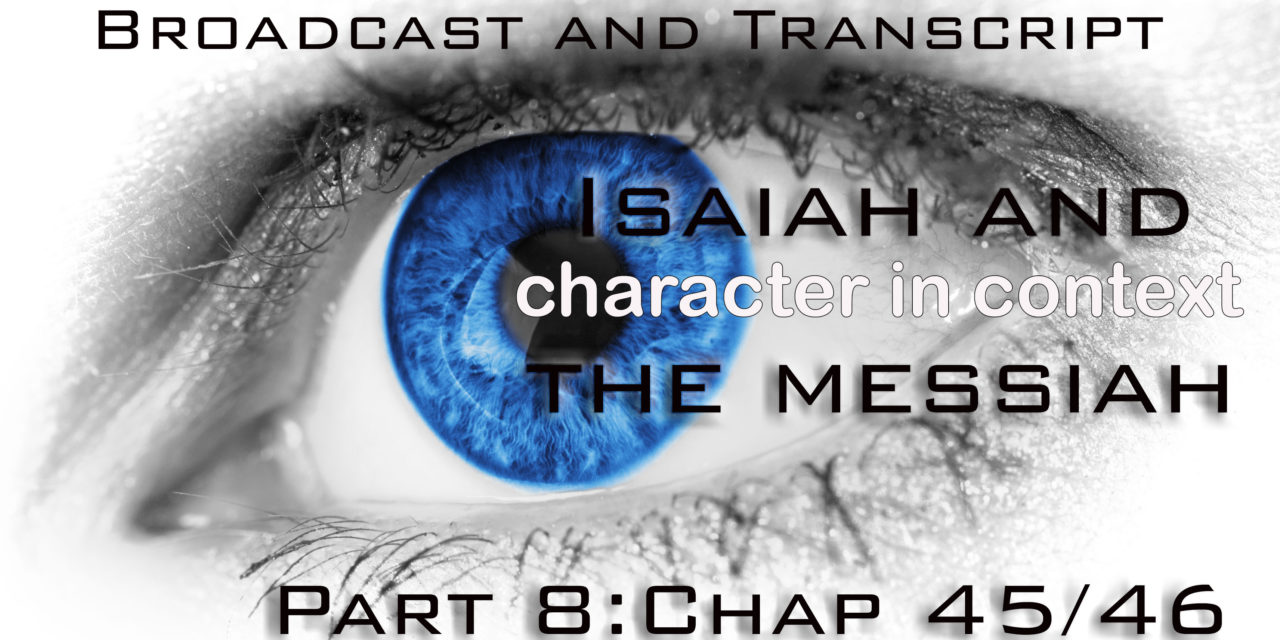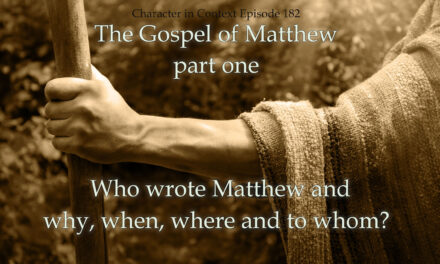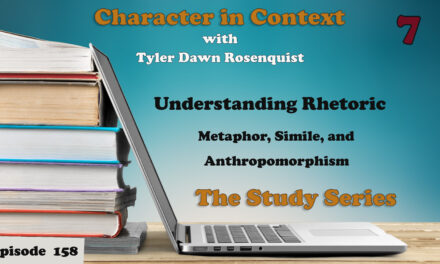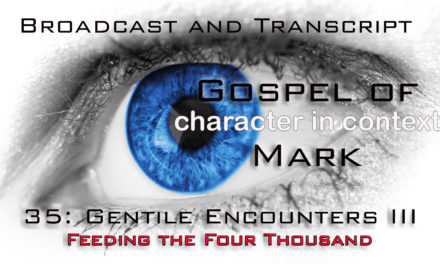Up to this point, things have been pretty grim in Yahweh’s disputations with the nations and their gods but now we see a big change. We see a prophesied move of the nations toward faith in the one true God and a growing divide between those who do and do not worship Him. In addition, we are treated to a very humorous caricature of Marduk, the chief God of the city of Babylon, and his son Nebo, the chief god of Borsippa as well as the god of wisdom and scribes.
Next week, our first mention of Babylon–up until now, the nations have been addressed as a monolithic group without any differentiation but now Babylon will be singled out for special attention.
Transcript below, not really edited for content. Consider overlooking my mistakes an opportunity to cultivate fruit.
********************
Isaiah and the Messiah part 8
Last week we had a history lesson on what we actually do know about Cyrus the Great, who is considered by modern-day Iranians to be the Father of their Civilization, their own personal Moses or George Washington. Hope you caught that because next week, when we study the “fall” of Babylon as an Empire, we will be talking about him again. He is described as Yahweh’s chosen anointed one, or Messiah, for the return of His people from exile, a partial exodus from the East because very few Jews decided to return despite Cyrus allowing and even enabling them all to go home.
This week, we will see our last idol polemic (and remember, an idol polemic is the literary term/genre for an insulting diatribe against idols and idolatry—and as polemic, it is often not going to be an accurate representation of idolatry but hyperbole, aka exaggeration, of the ridiculous nature of it). Always be careful when reading polemics, lest you take them too seriously or as historical documentation. Reading idol polemics badly is why a lot of westerners get entirely wrong ideas about idol worship and end up making some really bad assumptions. Part 2 of this series talks about this, which you can find on my podcast channel or blog. And speaking of which–
Hi, I am Tyler Dawn Rosenquist and welcome to Character in Context, where I teach the historical and ancient sociological context of Scripture with an eye to developing the character of Messiah. If you prefer written material, I have five years’ worth of blogs at theancientbridge.com as well as my six books available on amazon—including a four-volume curriculum series dedicated to teaching Scriptural context in a way that even kids can understand it, called Context for Kids—and I have two video channels on YouTube with free Bible teachings for both adults and kids. You can find the link for those on my website. Past broadcasts of this program can be found at characterincontext.podbean.com and transcripts can be had for most broadcasts at theancientbridge.com.
I will be quoting from the ESV, the English Standard Version, because that’s the version that my interlinear is in. Plus, I like it. I have also added a few more books to this study that I forgot to mention in past weeks—you can find the full resource list on theancientbridge.com in the transcript I provided for Isaiah and the Messiah part one. If you are interested in my full resource list for these teachings, they can all be found in the transcript of Isaiah and the Messiah part 1 on my blog. I am adding books to it as I expand my library. And thanks to those of you who financially support me because I was able to upgrade my logos program to gold and that got me a ton more commentaries to read through, in addition to my personal library at home. I don’t get paid to do this program, and so supporters like you really help me to fund my research.
This week we are starting in Isaiah 45:15 and will go through to 46:13. Scholars tend to lump this all into one section and I find it useful as well. Remember that we cannot be tied down to chapters as sometimes those divisions just aren’t the best for in-depth study and will put what should have been the beginning of one chapter as the end of another instead. The Bible chapters we use today were invented in 1227 by Stephen Langton, an Archbishop of Canterbury and the verses as we know them didn’t exist until 1448 when a Jewish Rabbi named Nathan got really energetic—because that was a much bigger job than dividing the word into chapters. As an aside, there is this fraudulent document called “The Archko volume” and sometimes people get really angry with me when I point out that it was a hoax, but it was claimed to be written in the first century and one of the most obvious errors in it is that the author has first century Jews referring to sections of Scripture by chapter and verse. See? It pays off to know Bible trivia!
This week we are going to see what one scholar calls the “Sovereignty Showcase” in that it really wraps up all of the themes we have been looking at with Yahweh expressing and establishing His authority and supremacy over Israel, over their fate, over all the world, over the upcoming deliverance of His people through Cyrus and over all the false gods of the nations who are powerless before Him.
14 Thus says the Lord: “The wealth of Egypt and the merchandise of Cush, and the Sabeans, men of stature, shall come over to you and be yours; they shall follow you; they shall come over in chains and bow down to you. They will plead with you, saying: ‘Surely God is in you, and there is no other, no god besides him.’”
Now this will sound familiar if you were listening to part five, Isaiah 43:3 where these same three nations were described as being ransomed for the sake of Israel. Of course, that never actually happened so we know that something else was being expressed here, and here again, we have this remarkable passage where Egypt, Cush (Ethiopians) and the Sabeans—the last of which were noted as being men of stature not only here but elsewhere. They must have truly been both tall and beautiful because looks are rarely commented on in Scripture.
At first glance, this looks like they are being enslaved or are at least slaves of Israel, but the actual language doesn’t bear that out. These nations and their goods and themselves—they are coming over willingly, they are following. They are even earnestly pleading with Israel, seemingly to learn how to follow Yahweh. Goodness, we see a fulfillment of this with the Ethiopian servant of Queen Candace in Acts 8 and remember that the verses after this will prove this out. Sometimes folks see the word “chains” and assume this is a captivity situation, but none of the rest of the passage bears that out. One can, like Paul, be in chains for God—not necessarily meaning actual chains but willing servitude. Time and again Paul and Peter and others in the NT call themselves slaves, bondservants, in chains, etc. Taking on the yoke is also seen, we become slaves of God and His kingdom and we do so willingly.
Oh, and how do we know this isn’t referring to them bowing down to and following Cyrus? All the “you” pronouns are feminine and can only refer to the nation of Israel to whom they are going/joining.
Is 19:19 In that day there will be an altar to the Lord in the midst of the land of Egypt, and a pillar to the Lord at its border.
So, nothing that should shock us here. In fact, this whole section is going to be blatantly outlining salvation not only for Israel but also the entire world at a future date—obviously not through the efforts of Cyrus! Let’s look at the next verses. The Egyptians, Ethiopians, and Sabeans (who, in faraway Babylonian exile, definitely would represent the farthest reaches of the known world) are addressing Yahweh here:
15 Truly, you are a God who hides himself, O God of Israel, the Savior.
Again we see Yahweh called Moschia, the savior, just as we saw Cyrus referred to in the same way in chapter 43, I believe. These nations at the end of the earth are turning and seeing Yahweh and saying that although He has been hidden from them, He and not their own gods, is the Savior.
16 All of them are put to shame and confounded; the makers of idols go in confusion together.
We have two competing destinies here because, before this, we had people from the nations confessing and recognizing Yahweh but on the other hand those who refuse will be shamed, confounded (thwarted and defeated because their gods are powerless) and will remain confused—blind, deaf, etc ala Psalm 115 and Isaiah 6.
17 But Israel is saved by the Lord with everlasting salvation; you shall not be put to shame or confounded to all eternity.
As opposed to those who persist in idolatry, Israel (now evidently including peoples from far off) will enjoy everlasting salvation and will not be shamed, thwarted and defeated. At least not permanently—that’s why it adds “to all eternity.” Believers always have setbacks and defeats, that’s just part of the life and anyone who tells you differently is probably making a lot of money saying it!
18 For thus says the Lord, who created the heavens (he is God!), who formed the earth and made it (he established it; he did not create it empty, he formed it to be inhabited!): “I am the Lord, and there is no other.
19 I did not speak in secret, in a land of darkness; I did not say to the offspring of Jacob,
‘Seek me in vain.’ I the Lord speak the truth; I declare what is right.
I want to share a very cool quote from my favorite Isaiah commentary. The NICOT by John Oswalt in Is 40-66 from page 218:
“These verses show a rather profound understanding of paganism. Because paganism refuses to admit of a god who stands outside the cosmos, it must posit that the beginning of all things was matter in chaos. Out of this chaos the gods emerged. The ordering of chaos was something of an afterthought on the part of the gods to protect themselves from the ever-present danger of its re-emergence. Humans are even more of an afterthought, created primarily to take care of the gods, Since the gods have no commitment to and accept no responsibility for humans, they have no interest in communicating with them. If humans wish to divine the future, they must resort to mediums, wizards, and necromancers (this will be important next week). To all of this, Isaiah says a resounding no!
Chaos did not exist before God, and God did not bring a meaningless chaos into existence. Rather, the pre-existent God created the cosmos specifically for human habitation.”
He goes on to talk about how, unlike the pagan gods, humans have no need of dark arts to try and discern His will. Oswalt says that God Himself initiated the conversation with humanity. He communicates His will to us and therefore is trustworthy and unlike the gods of the nations who were just a source of stress and worry in their secrecy. Expensive book, but so totally worth every penny.
Now, we have another disputational speech. Remember these? We also covered this in chapters 41 and 43, Yahweh’s legal challenge to the nations. These are fun and are often coupled with idol polemics.
20 “Assemble yourselves and come; draw near together, you survivors of the nations! They have no knowledge who carry about their wooden idols, and keep on praying to a god that cannot save.
21 Declare and present your case; let them take counsel together! Who told this long ago? Who declared it of old? Was it not I, the Lord? And there is no other god besides me, a righteous God and a Savior; there is none besides me.
Again, one of our common themes here. Yahweh expresses His uniqueness by pointing out the one thing that the gods have never been able to lay claim to—prophesying the future ahead of time and having it come to pass. Yahweh outright accuses their worshipers of having no knowledge, being ignorant of the future because their gods themselves are ignorant of the future. I put it this way, and I have explained the pagan Law of Continuity in the past that tells us that gods are part of the system and not outside of it, so their worshipers thought that they were almost as much at the mercy of history and fate as they themselves were. So, this is how maybe I will try and explain it better—unlike Yahweh, who is unique with being outside of the system, the cosmos, and outside of history, controlling it, the gods of the nations are caught up in what I call the “stream of history” without a paddle—thus they cannot control it and they cannot predict it. This makes Yahweh unique and it made Him utterly puzzling to the nations whose gods were very limited in function and ability and authority and power.
Yahweh lays it on the line—“your gods are worthless. Please, confer amongst yourselves and come up with evidence of them ever predicting anything ahead of time. In all of history you will only see that I have done it because, among the gods of all the nations, I am the only righteous God and the only Savior.”
Again, anti-missionaries like to use this out of context to say Yeshua can’t be the Messiah, but when the context is taken into account, Yahweh is speaking to the nations and imploring them to turn away from their idols. As we will see next week, taking things out of context often causes people to toss out the Bible altogether and rejecting it wholesale. Once we start taking verses out of context, it is inevitable that we will get into trouble and drag folks down with us.
So what is Yahweh’s response to the nations’ dilemma of having pathetic, powerless, worthless and non-existent gods?
22 “Turn to me and be saved, all the ends of the earth! For I am God, and there is no other.
23 By myself I have sworn; from my mouth has gone out in righteousness a word that shall not return: ‘To me every knee shall bow, every tongue shall swear allegiance.’
24 “Only in the Lord, it shall be said of me, are righteousness and strength; to him shall come and be ashamed all who were incensed against him.
25 In the Lord all the offspring of Israel shall be justified and shall glory.”
Wow, wow, wow. Just like a few weeks back when we saw how Yahweh was wiping the slate clean of both unintentional chattat “sin” and willful rebellious pescha “transgression,” once again we see Yahweh’s amazing and mind-boggling grace extended toward the idol-worshiping nations! He beckons them. “Come to me, all these other “gods” you worship are not gods at all and they cannot save you. Every knee will someday bow before me, whether in love or as convicted and condemned rebels.”
It says “all the ends of the earth here” and hey, that means even Babylon. Universal submission, one way or the other, each individual makes their own choice as we talked about in Isaiah 44:5
“This one will say, ‘I am the Lord’s,’ another will call on the name of Jacob, and another will write on his hand, ‘The Lord’s,’ and name himself by the name of Israel.”
How can we not marvel at the lengths this God will go to in order to save even His enemies??!!
Now we are going to venture into Isaiah 46 and here is where it just gets absolutely comical with the very last honest to goodness idol polemic, setting up for Yahweh’s dismantling of Babylon herself in chapter 47. Remember that a country’s gods, when it really comes down to us, only serve the purpose of establishing and propping up the government. The priests, as mediators, had a lot of power over policy and even over who came to power and who fell from grace. We saw this with the priests of Marduk and Nabonidus and Cyrus last week. This will actually be the first naming of gods—up until this point, everything as been addressed to the nations as a whole. Chapters 46 and 47 are a divergence from this pattern because the focus up to now has been on Yahweh and his people and the people whom He wants to be His people—if that makes sense.
Imagine a processional, perhaps like the one in the Akitu (barley cutting) New Year festival at the beginning of the Babylonian New Year at the cusp of the months of Adar and Nisan. Or perhaps when Merodach-Baladan pre-emptively evacuated the idols out of Babylon in 703 when Sennacherib attacked Babylon. Imagine these mighty idols on the backs of beasts, tottering and wavering back and forth, unable to hold themselves up straight—hardly dignified. This last picture is more shameful than the ones before it and the comparison to Yahweh could hardly be more insulting to them.
I am going to make reference to Bel and Nebo here. Understand that Bel simply means “lord” or “master”—it is a generic word in Akkadian. It is like the Hebrew ba’al, which is generic for lord or master and is only indicative of something pagan if context dictates, or kyrios in Greek. Lots of these types of words—elohim is another that can mean Yahweh, or a pagan god or just rulers or other mighty men. No words really are pagan in and of themselves. Titles are used for good and bad throughout Scripture. English words like god, lord, master, etc are the same.
So who is Bel here? Marduk, the chief god of Babylon. Nebo was the son of Marduk in Babylonian mythology and he was the chief deity of Borsippa. Marduk was the head of the pantheon, as we see in Enuma Elish, their creation epic, and Nebo was the god of wisdom and scribes.
46 Bel bows down; Nebo stoops; their idols are on beasts and livestock;
these things you carry are borne as burdens on weary beasts.
2 They stoop; they bow down together; they cannot save the burden,
but themselves go into captivity.
Just wow, this isn’t very dignified. The mighty gods are on the backs of beasts, and not like horses or mules but livestock. We’re talking probably oxen here. How on earth do you have a huge lifesized city idol on the back of an ox anyway? There is no way to keep it upright—you can just see this thing swaying back and forth. Now, I know I mentioned the Akitu festival, but when that happened it was very dignified and the king held Marduk’s hand as they made their way along the streets. So, this isn’t looking like that. This is mockery. But I have to say that this never happened historically when Cyrus took over Babylon. He worshiped Marduk and all the other gods of the cities he took. So, this is metaphorical and not something that happened historically. This polemic is for the sole purpose of making Marduk and Nebo look ridiculous and defenseless and unable to carry anyone when they can’t even carry themselves, they need cows to do it for them. They also didn’t go into captivity, at least not at this time. We’ll talk more about the fate of Babylon next week.
3 “Listen to me, O house of Jacob, all the remnant of the house of Israel,
who have been borne by me from before your birth, carried from the womb;
4 even to your old age I am he, and to gray hairs I will carry you.
I have made, and I will bear; I will carry and will save.
Wowzers. The picture here suddenly shifts from the ridiculous caricature of an idol processional with idols being carted off into exile on the backs of smelly animals, to a picture of Yahweh being that carrier for Israel. The idols couldn’t carry anyone, they had to be carted around on beasts but Israel is carried by Yahweh Himself and unlike our human lives, where parents carry their children when they are young and children then carry their parents once they are old—a loving role reversal, Yahweh says that He carries Israel from cradle to grave in an unchanging relational dynamic.
5 “To whom will you liken me and make me equal, and compare me, that we may be alike?
This is specifically directed toward the Israelites who are still intimidated by Babylon and its gods. Will you compare me, who faithfully carries your nation and always has, to these idols who reek of ox manure? Okay, yes, it doesn’t say the bit about ox manure, that’s just me being dramatic. But it’s funnier that way. He challenges, “explain to me how Bel and Nebo measure up to me.”
6 Those who lavish gold from the purse, and weigh out silver in the scales, hire a goldsmith, and he makes it into a god; then they fall down and worship!
7 They lift it to their shoulders, they carry it, they set it in its place, and it stands there; it cannot move from its place. If one cries to it, it does not answer or save him from his trouble.
“It can’t measure up to me. None of them can, because you humans made them. You even know you made them. You paid people to make them—their origin isn’t even shrouded in mystery. And you expect it to be able to do anything for humans when it can’t make humans because humans made it!”
Remember, God keeps having to tell them that He is on the outside of the system because their parents and grandparents and great-greats were henotheists worshipping Yahweh plus all these other gods on the side so this had become their world view. This wasn’t the natural way of looking at gods in the ancient world. He was asking them to accept a complete paradigm change. Something to think about when you judge polytheists who have trouble accepting our God. He doesn’t fit into the way they “know” the world runs. We take for granted that this all makes sense to us because we are special or smart when, in actuality, we believe this only because it is our normal context here in the West. To us, polytheism is as nonsensical and ludicrous to us as monotheism is to them.
8 “Remember this and stand firm, recall it to mind, you transgressors,
There is more to this verse than meets the eye. It’s fun and a bit of a mystery. Remember what? We will get clarity on that in the next verse. But they are commanded to recall it to “leb”—their heart. Now, I hope you all know that although the Bible was written for us, as John Walton loves to say, it was not written to us. It was written to people who had certain beliefs and understandings and God always speaks to people where they are at. For example, if God was going to talk to you about science, it would not be the way He would talk to me about science, unless you have a degree in chemistry or physics or math. When I hear the word organic, I think of entirely different things than a non-chemist. If He used that word with you the way He uses it with me, you would probably think He was talking about non-GMO food without pesticides but to me that word always means covalent carbon compounds. To a biologist, that word means something related to a living organism. You see, words can mean different things and carry different understands. Personally, I resent my word being hijacked by the food industry and the meaning changed. It’s like not being able to say I am gay when I am happy without having sexual connotations.
But anyway, here we have “recall it to heart.” At this time in history, science was in its infancy. Engineering was awesome and fairly advanced, but science—not so much. They thought the brain was like skull wadding and believed that people thought with their hearts. They also believed that emotions were all centered in the stomach. I believe it was the Greeks who figured out the truth about the brain, but it’s funny because the Egyptians saved all the organs they thought were responsible for intellect and threw away the brains for their mummies. Imagine all the Pharaohs wandering through the afterlife with no brains. It’s like zombie time. I mean, if all that was real and all, it would be funny.
Let’s do that verse again so you remember where we were before I went off on the rabbit trail:
8 “Remember this and stand firm, recall it to mind, you transgressors,
That “stand firm”—it is a Hebrew word that only appears once in Scripture and no one, and I mean no one knows for sure what it means. It is unique. But that’s how most translate it. And who are these transgressors being referred to? Let’s keep reading.
9 remember the former things of old; for I am God, and there is no other;
I am God, and there is none like me,
The people commanded to remember, the transgressors, what God has done in the past have to be Israel because they are the only ones who have any established history with Him to remember. Remember how He said, in 43:18, “do not remember the former things”? Well, here He says the opposite and so we always have to understand the context. In chapter 43, He was telling them not to get boxed in to thinking there is only one way for Yahweh to deliver them, that he was doing an old thing (saving them) in a new way (through a pagan king)—this time He is saying to remember because they need to remember how trustworthy He is. They need to remember His proven track record and trust.
10 declaring the end from the beginning and from ancient times things not yet done,
saying, ‘My counsel shall stand, and I will accomplish all my purpose,’
11 calling a bird of prey from the east, the man of my counsel from a far country.
I have spoken, and I will bring it to pass; I have purposed, and I will do it.
Why is He commanding them to remember His works? Because He needs them to get a grip and come to terms with the fact that He has made a final decision, He is not consulting with them, not asking their advice. He doesn’t care if they like His plans.
His “bird of prey from the east” is obviously Cyrus the Great, as we have seen for many weeks now and even mentioned by name. Cyrus is the “man of my counsel from a far country.” Cyrus is doing what Yahweh commands him even though he doesn’t even know it. Time and again, Yahweh influences heathens to do things without them even realizing it. He hardened Pharaoh’s heart to behave in the most stupid ways possible. He turned armies against one another, slaughtering themselves. He does what He wants and he doesn’t ask permission.
What does He sum it all up with? “I have spoken, and I will bring it to pass; I have purposed, and I will do it.“ Really nothing left to discuss. There never was anything to discuss.
12 “Listen to me, you stubborn of heart, you who are far from righteousness:
13 I bring near my righteousness; it is not far off, and my salvation will not delay;
I will put salvation in Zion, for Israel my glory.”
These boneheads are “far from righteousness.” They are on the wrong side of this, still. But Yahweh is still going to save them whether they like it or not, whether they approve or not and—as it turns out historically—they are not going to cooperate. But Yahweh is going to do His part no matter what.





















